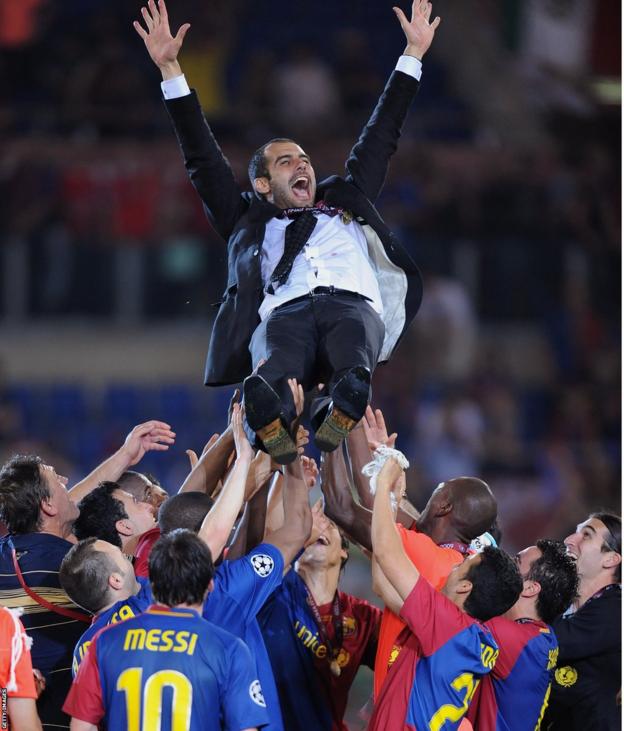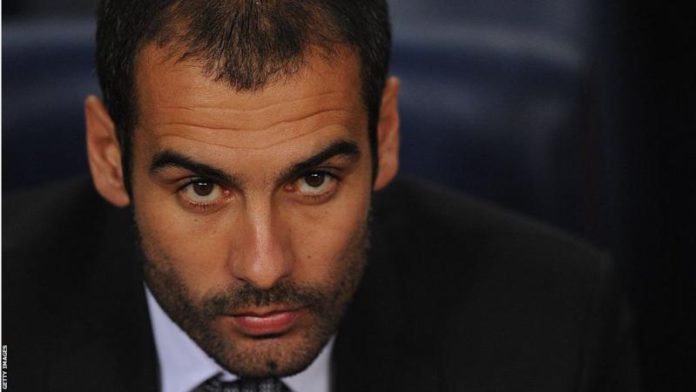A decision in time sends history down two very different tracks.
In 1998, a Hollywood film starring Gwyneth Paltrow catapulted the term ‘Sliding Doors’ into popular lexicon.
Ten years later, football had its own Sliding Doors moment.
In the summer of 2008, Barcelona – managed by Frank Rijkaard – were a club stalled and set to fall.
A second trophyless season in succession had ended with Barca third in La Liga and suffering ignominy at the Bernabeu.
With Real Madrid confirmed as champions in the days before, Barcelona had to give their arch-rivals a guard of honour on to the pitch before their league meeting.
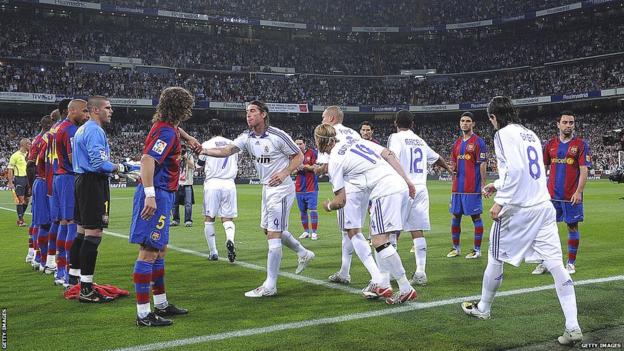
The embarrassment didn’t stop there. A 4-1 thrashing followed, with the Madrid fans chanting “Laporta please stay!” to Barca’s under-pressure president Joan Laporta.
Off the pitch, dressing-room ringleader Ronaldinho was spending more time in the city’s nightclubs than banging in goals.
Team discipline seemed to have drained away, with stories of the Brazilian being left to get his head down and sleep off the night’s excesses rather than knuckle down in training.
Questions over Ronaldinho’s weight gain, and penchant for a night out, peppered the front and back pages of Barcelona’s newspapers while in press conferences, every question directed at Rijkaard included the word “resign”.
With the Madrid fans’ catcalls still ringing in his ears, Laporta provided his own answer.
Less than 24 hours after the embarrassment in Madrid, Rijkaard was sacked.
Who would replace him?
Top of the billing, and top of the list for any football pragmatist, was Jose Mourinho.
Mourinho had a positive historical relationship with the club as assistant to previous managers Bobby Robson and Louis van Gaal.
He also had a CV surpassing anyone else in Europe at the time, following Uefa Cup and Champions League triumphs with Porto, and successive and unprecedented Premier League titles with Chelsea.
But, rather than opt for the A-list football celebrity, Barcelona opted for someone from the B-list. Literally.
They chose their own B team manager, who was entirely unproven at the top level, and had spent the previous campaign – his first as a boss – in Spain’s fourth tier and a Catalan regional division.
The decision?
Guardiola over Mourinho.
To understand why, and to get to the bottom of that decision that changed football, you have to dig deep into Barcelona DNA’s where poetry, not pragmatism, is the primary motivator and one man’s methods, opinions and gut instinct trump everything.
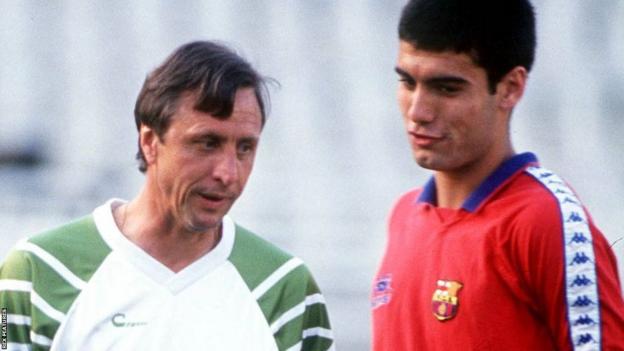
As the new BBC Sport documentary Pep Guardiola: Chasing Perfection explores, to understand Pep, you have to understand Johan Cruyff.
Cruyff is synonymous with Barcelona, winning La Liga in 1974 and the Copa del Rey in 1978 as a player, before lifting four consecutive Spanish top-flight titles, and the European Cup, as the club’s manager between 1988 and 1996.
And Cruyff wielded an incredible influence over Guardiola’s career.
It was Cruyff who plucked a 19-year-old Guardiola from the Barcelona reserves in 1990 and catapulted him into an all-conquering first team full of global stars such as Michael Laudrup to Ronald Koeman. Cruyff saw in the teenage Guardiola a quality that endures.
Spanish journalist Lu Martin knows Guardiola better than most, having ghost-written his little-known 2001 book La Meva Gent, El Meu Futbol (My People, My Football in Catalan).
“In Catalonia, we say ‘seny’ and ‘rauxa’. [Legendary Barcelona captain Carles] Puyol has ‘rauxa’ – impulse, drive,” Martin says.
“The ‘seny’ – the brains – at FC Barcelona was Pep.
“Pep brought sense to the team – because Pep could understand everything Johan wanted from him.
“Johan had two sons. Jordi, his son by blood, and his sports son…Pep.”
Jordi Cruyff echoes Martin’s assessment of his father and Guardiola’s close relationship.
Jordi remembers his father having supreme confidence in Guardiola as a budding manager after his protege wound down his playing career with underwhelming spells at Brescia, Roma, Al-Ahli and Mexican club Dorados.
“I know in that time Pep and my father had a lot of contact,” Jordi Cruyff says of the months after Guardiola’s retirement in 2006.
“I think my father had this kind of intuition that he could feel when somebody is going to be a good coach.”
An frequent criticism of Guardiola is that all three of his top-level managerial jobs – Barcelona, Bayern Munich and Manchester City – have been clubs with big-name players and big pockets.
The inference is that the Spaniard couldn’t work his magic in a smaller, more humble, setting.
It didn’t get much smaller than Barcelona B.
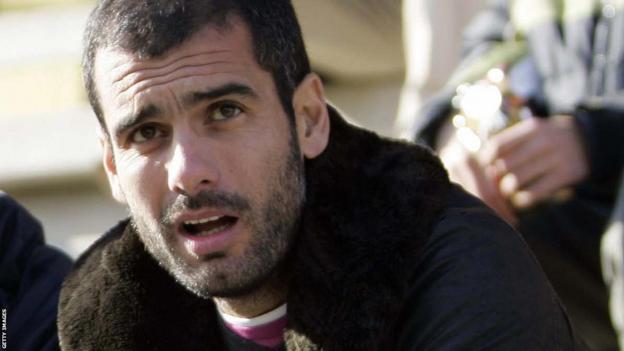
“Yes, I was a player, but I’ll start from zero as a coach,” said Guardiola, then 37, in his first press conference in charge of Barcelona B.
It was a surprise he had taken the job, given a role as head of the academy – seen as more prestigious – was also on the table.
However, Barcelona B, like Guardiola, were starting from scratch. In the previous season, they had been relegated after failing to win their final 10 matches.
Guardiola’s first match in charge was a pre-season friendly played on a tiny, artificial pitch against Banyoles. Small pitches and, when matches were played on grass, bobbly surfaces were a theme in a tricky start to managerial life.
Barcelona B won one of their first three matches.
After a 2-0 defeat by lowly Manresa, who were eventually relegated, Guardiola endured his first test of faith. Could his playing style – prioritising possession over position on the pitch – thrive in the testing conditions of the fourth tier?
By the time he arrived at training on the Wednesday after that defeat, he had made his mind up.
“I had thought we have to change because the pitches are so small,” he says.
“I doubted for two days. But, in that moment, I decided – if we could win and play quite good football on a small pitch, I could do it at a higher level with better players and better pitches.
“I arrived at training and said: ‘This is what I believe.’ The alternatives, the ways we looked at changing, they did not convince me. That is why I could not change.
“It was an important moment because I was new, I was not experienced. Aged 37, never trained big players. I had to prove myself.”
One man he didn’t need to prove himself to was Domenec Torrent.
Torrent had been managing fellow fourth-tier outfit Girona. When Guardiola, a man he had revered as a player came knocking, Torrent jumped at the chance to join him.
Torrent spent 11 years at Guardiola’s side as his assistant before leaving Manchester City for a head coach role with New York City FC in 2018.
“I always say Pep has great powers of seduction,” he says.
“He’s someone who can convince players with his everyday work with them. He’s a sponge.
“He learns very quickly about everything and everyone.
“He turned Barcelona B into a very compact side who played very good football. And he put across to the players his ideas, which were totally different from anything they’d heard up until then.
“It’s true that we built a very good squad.”
Sergio Busquets, Pedro and Thiago Alcantara were rookie faces in that squad and Guardiola was the uncompromising, relentless, ruthless driving force at the centre of it.
Professionalism was to the fore. Opposition sides were scouted and video-analysed, a level of detail unheard of in that division at the time.
An 11pm curfew was introduced – as were fines.
“Pep had very clear boundaries, he did not let anybody do anything that he thought was out of place,” Pep’s then-captain Marc Valiente has said. “He had a very clear code. You had to adhere to that in terms of the rules, in terms of fines, and I think that was fair.”
Barcelona’s then-sporting director Txiki Begiristain – now in the same job at Manchester City – also remembers Guardiola’s pursuit of perfection.
“It was unbelievable,” Begiristain says. “In England, the level would be like League Two.
“Pep was working in League Two like he was in [charge of] the [Barcelona] first team: Looking after the players, food, chefs, travelling, recording the games.
“He was really amazing. He was thinking ‘one day I’m gonna be a first-team coach, I wanna work like this’.
“And so, he was already doing it in the fourth tier. It was crazy.”
After their inauspicious start, Guardiola’s Barcelona B’s form dramatically improved en route to winning promotion.
Guardiola’s work-rate won hearts in the boardroom, most notably with the most influential Barcelona face of all.
“I remember that Johan Cruyff visited a lot with his wife to see the Barca B games,” Torrent says.
“And, strangely, I saw that instead of watching the game, he was watching Pep, how he managed, how he behaved, how he moved: his body language.
“And I remember mentioning to Pep: ‘That’s the second time Johan’s been to see you and he was just watching you.’ All that made sense when Pep took over the first team.
“I remembered those afternoons when Johan came to see him, not the football.”
Promotion cost Guardiola a fair bit of money.
At the beginning of the campaign, he had promised to buy the team lunch oif they won three games in a row. It happened on five occasions.
The team’s most important performance, though, was to come in a friendly against Rijkaard’s increasingly disjointed and disengaged first team, watched by a handful of spectators.
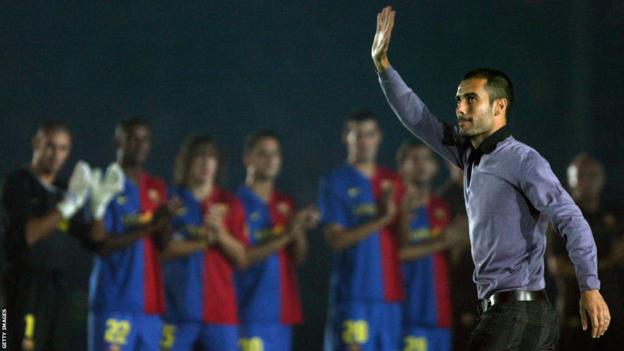
“I don’t think I run and chased the ball as much ever,” former Barcelona forward Eidur Gudjohnsen says.
Combined with Cruyff’s weekly scouting reports, the friendly was key to persuading the Barcelona board that Pep was the man for the top job.
“They had a certain way of playing,” Gudjohnsen continues.
“It was almost as if we couldn’t get near them. I’m pretty sure some of some of the first-team players didn’t take it as seriously as we should have.
“But I still remember that I thought: ‘Wow, how are they playing? Why is there always a spare man?’
“It was very difficult to pressure them.”
For the first team, the match was an embarrassment. Ronaldinho was withdrawn after just 10 minutes. Deco also reportedly struggled in the face of the relentless reserves.
Pep’s pressure was to prove too much for the Barcelona board as well.
A combination of the B team’s promotion, the friendly farce and Rijkaard’s reticence to discipline his wayward squad forced a change at the top.
The choice was clear. Europe’s top dog, the all-conquering disciplinarian Jose Mourinho? Or the poetic choice, the possession-obsessed Pep Guardiola?
Xavier Sala-i-Martin was at the centre of those conversations as Barcelona treasurer and a board member between 2004 and 2010.
“Everybody knows we have this problem,” he recounts in Pep Guardiola: Chasing Perfection.
“Ronaldinho plays bongos until two in the morning every night. How do you stop it? We need a sergeant, a general.
“Who is the greatest general in the world? Jose Mourinho right?
“Given the problems we had, the solution seem obvious. Unfortunately, Mourinho doesn’t fit with Barcelona’s DNA.
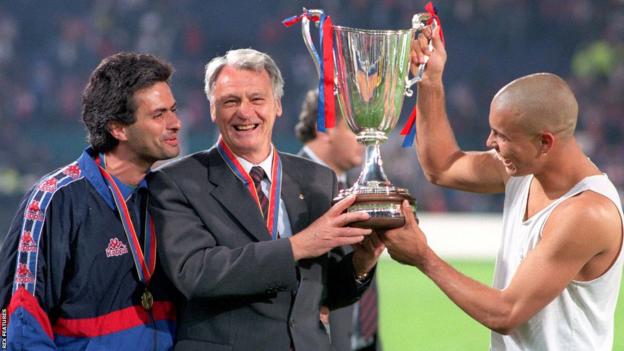
“Barcelona DNA has many aspects. One of them is the way we play.
“We inherited these from Johan Cruyff. We win when we play Dutch-style football. The best student of Cruyff is Pep.
“But Mourinho has won the Champions League. So there was a big debate.
“But Joan Laporta said: ‘We cannot go Mourinho’s direction….he doesn’t play our style. He’s a defensive manager with counter-attacks. That’s not the way we play.’
“And also, he’s not a real gentleman. The way he tries to manipulate, he doesn’t act the Barcelona way on the field.”
It still could have gone either way as Sala-i-Martin remembers but, for, appropriately the intervention of one man.
“A lot of members of the board were in favour of Mourinho,” he said.
“Laporta consulted with Johan [Cruyff] and said do you think Pep’s ready?
“And Johan said yes. And when Johan says yes, it’s yes.”
Ultimately, A-list Barcelona royalty insisted on an untested B team boss.
And football has not been the same since.
